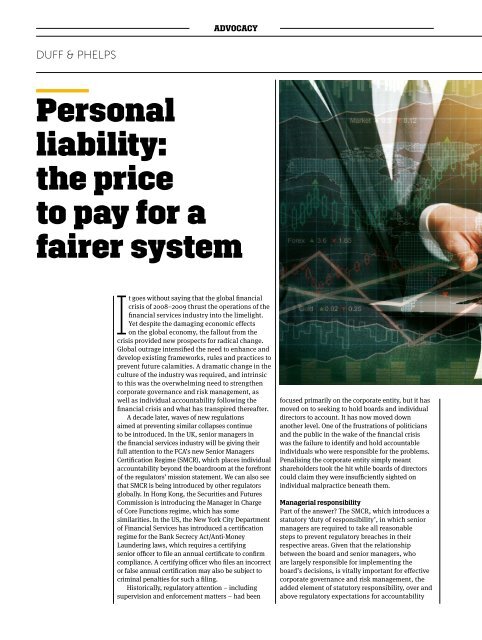G20-Germany-Hamburg-2017
mo.rami@trmg.co.uk
mo.rami@trmg.co.uk
You also want an ePaper? Increase the reach of your titles
YUMPU automatically turns print PDFs into web optimized ePapers that Google loves.
ADVOCACY<br />
DUFF & PHELPS<br />
Personal<br />
liability:<br />
the price<br />
to pay for a<br />
fairer system<br />
It goes without saying that the global financial<br />
crisis of 2008–2009 thrust the operations of the<br />
financial services industry into the limelight.<br />
Yet despite the damaging economic effects<br />
on the global economy, the fallout from the<br />
crisis provided new prospects for radical change.<br />
Global outrage intensified the need to enhance and<br />
develop existing frameworks, rules and practices to<br />
prevent future calamities. A dramatic change in the<br />
culture of the industry was required, and intrinsic<br />
to this was the overwhelming need to strengthen<br />
corporate governance and risk management, as<br />
well as individual accountability following the<br />
financial crisis and what has transpired thereafter.<br />
A decade later, waves of new regulations<br />
aimed at preventing similar collapses continue<br />
to be introduced. In the UK, senior managers in<br />
the financial services industry will be giving their<br />
full attention to the FCA’s new Senior Managers<br />
Certification Regime (SMCR), which places individual<br />
accountability beyond the boardroom at the forefront<br />
of the regulators’ mission statement. We can also see<br />
that SMCR is being introduced by other regulators<br />
globally. In Hong Kong, the Securities and Futures<br />
Commission is introducing the Manager in Charge<br />
of Core Functions regime, which has some<br />
similarities. In the US, the New York City Department<br />
of Financial Services has introduced a certification<br />
regime for the Bank Secrecy Act/Anti-Money<br />
Laundering laws, which requires a certifying<br />
senior officer to file an annual certificate to confirm<br />
compliance. A certifying officer who files an incorrect<br />
or false annual certification may also be subject to<br />
criminal penalties for such a filing.<br />
Historically, regulatory attention – including<br />
supervision and enforcement matters – had been<br />
focused primarily on the corporate entity, but it has<br />
moved on to seeking to hold boards and individual<br />
directors to account. It has now moved down<br />
another level. One of the frustrations of politicians<br />
and the public in the wake of the financial crisis<br />
was the failure to identify and hold accountable<br />
individuals who were responsible for the problems.<br />
Penalising the corporate entity simply meant<br />
shareholders took the hit while boards of directors<br />
could claim they were insufficiently sighted on<br />
individual malpractice beneath them.<br />
Managerial responsibility<br />
Part of the answer? The SMCR, which introduces a<br />
statutory ‘duty of responsibility’, in which senior<br />
managers are required to take all reasonable<br />
steps to prevent regulatory breaches in their<br />
respective areas. Given that the relationship<br />
between the board and senior managers, who<br />
are largely responsible for implementing the<br />
board’s decisions, is vitally important for effective<br />
corporate governance and risk management, the<br />
added element of statutory responsibility, over and<br />
above regulatory expectations for accountability
















